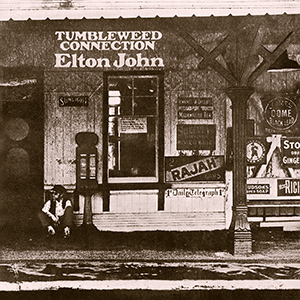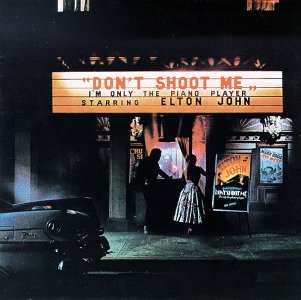Related Research Articles

Elton John is the second studio album by English singer-songwriter Elton John. It was released on 10 April 1970 through DJM Records. Including John's breakthrough single "Your Song", the album helped establish his career during the rise of the singer-songwriter era of popular music.

Tumbleweed Connection is the third studio album by English singer-songwriter Elton John. It was recorded at Trident Studios, London, in March 1970, and released in October 1970 in the UK and January 1971 in the US. It is a concept album based on country and western and Americana themes. All songs are written by John and Bernie Taupin, with the exception of "Love Song" by Lesley Duncan.

Don't Shoot Me I'm Only the Piano Player is the sixth studio album by English musician Elton John. Released on 26 January 1973 by DJM Records, it was the first of two studio albums he released in 1973, and was his second straight No. 1 album on the US Billboard 200 and first No. 1 album on the UK Albums Chart.

Blue Moves is the eleventh studio album by English musician Elton John. It was released on 22 October 1976 through John's own Rocket Record Company, alongside MCA Records in certain countries. John's second double album, it was recorded at EMI Studios, Brother Studios, Eastern Sound and Sunset Sound Recorders, and was his last to be produced by longtime collaborator Gus Dudgeon until Ice on Fire (1985). Additionally, the album would be the last collaboration between John and lyricist Bernie Taupin for the next few years until a partial resumption of their working partnership with 21 at 33 (1980).

"Tiny Dancer" is a song written by English musician and composer Elton John and lyricist Bernie Taupin, and performed by John. It was originally released on John's 1971 album Madman Across the Water as its opening track, and was later produced and released as a single in 1972.

21 at 33 is the fourteenth studio album by British musician Elton John. It was released on 23 May 1980, through MCA Records in the US and The Rocket Record Company in all other territories. The album was co-produced by John and Clive Franks, and was primarily recorded in August 1979 at Super Bear Studios in Nice, France. The record was the first since Blue Moves (1976) to feature lyrics written by Bernie Taupin, while John also continued to experiment with other lyricists, including Gary Osborne and Tom Robinson. Contributors to the album include members of Toto and the Eagles, as well as Dee Murray and Nigel Olsson, marking their first appearance on an Elton John album since Captain Fantastic and the Brown Dirt Cowboy (1975).
Live in Australia with the Melbourne Symphony Orchestra is the twenty-eighth official album release for English musician Elton John, released in 1987. It is a live album recorded at the Sydney Entertainment Centre on 14 December 1986 with the Melbourne Symphony Orchestra.

"Levon" is a song written by English musician Elton John and songwriter Bernie Taupin, and performed by John. It was recorded on 27 February 1971, and was released on John's 1971 album, Madman Across the Water. Backing vocals are provided by Tony Burrows. Paul Buckmaster wrote the orchestral arrangements and conducted the orchestra.

"Take Me to the Pilot" is a song written by English musician Elton John and songwriter Bernie Taupin, and performed by John. It was originally released on John's eponymous second album in 1970.
"Skyline Pigeon" is a ballad composed and performed by English musician Elton John with lyrics by Bernie Taupin. It is the eighth track on his first album, Empty Sky. It was originally released by Guy Darrell and Roger James Cooke simultaneously as a single in August 1968.
"Come Down in Time" is the second track on Elton John's third album, Tumbleweed Connection, released in 1970. The lyrics were written by Bernie Taupin, Elton's long time writing partner. The song was originally recorded for John's second album, Elton John.
"Crazy Water" is a song by English musician Elton John with lyrics written by Bernie Taupin. It is the seventh track on his 1976 album, Blue Moves. It was released as a single in the UK in February 1977. The single reached No. 27 in the UK singles charts.

"Original Sin" is a 2001 song performed by English musician Elton John from his 26th studio album, Songs from the West Coast. The song was written by Elton John and Bernie Taupin and is the final single of the album.

"Ego" is a 1978 song performed by English musician Elton John, written by John and Bernie Taupin. It was released in early 1978 as a standalone single, and did not appear on the album released in the same year, A Single Man. John played this song live from 1978 up until 1980. The single reached #34 in both the UK and the US.

"Street of Dreams" is a song by the American rock band Guns N' Roses, featured on their 2008 album Chinese Democracy. The song is the third promotional song sent to radio stations, but was not released as a commercial single eligible for international Singles charts. From 2001 to 2008, the song was called "The Blues", but was changed to "Street of Dreams" for the album's release.
"I Think I'm Going to Kill Myself" is a song written by English musician Elton John and songwriter Bernie Taupin, and performed by John. The song was released on the 1972 album Honky Château, and is a tongue-in-cheek parody of a moody teenager's thoughts about suicide.

Live at Benaroya Hall with the Seattle Symphony is the fourth album by American singer-songwriter Brandi Carlile, released on May 3, 2011, through Columbia Records. Recorded during two sold-out shows in November 2010 at Benaroya Hall in Seattle, Washington, the album features Washington-native Carlile and her long-time band performing alongside the Seattle Symphony. Seattle-based producer and audio engineer Martin Feveyear recorded the concerts, which contained orchestral arrangements by Paul Buckmaster and Sean O'Loughlin. Carlile had previously performed with the Seattle Symphony in 2008 at the same venue.
The Tour De Force was a concert tour by English musician and composer Elton John. The tour consisted in 26 shows scheduled in Australia accompanied by the Melbourne Symphony Orchestra.

"Elderberry Wine" is a song written by English musician Elton John and songwriter Bernie Taupin, and performed by John. It was first released on John's 1973 album Don't Shoot Me I'm Only the Piano Player. It was also released as the B-side of John's No. 1 hit "Crocodile Rock" in October 1972. It was also popular on album-oriented rock radio stations. John played it live during his 1973 tour. It was covered by Irish-Scots singer Mae McKenna.

"Harmony" is a song written by English musician Elton John and songwriter Bernie Taupin, and performed by John. It is the final song on the 1973 double album Goodbye Yellow Brick Road. The song was recorded in May 1973, at Château d'Hérouville, France.
References
- 1 2 3 4 Guarisco, D.A. "Have Mercy on the Criminal". AllMusic . Retrieved 4 March 2012.
- 1 2 Cassata, M.A. (2002). The Elton John Scrapbook. Citadel. pp. 96, 112. ISBN 978-0-8065-2322-4.
- ↑ Buckley, D. (2007). Elton: The Biography . Chicago Review Press. p. 147. ISBN 978-1-55652-713-5.
- 1 2 3 Rosenthal, E.J. (2001). His song: the musical journey of Elton John. Random House. pp. 54, 520. ISBN 978-0-8230-8893-5.
- ↑ Norman, P. (1993). Elton John. Simon & Schuster. pp. 12, 229. ISBN 978-0-671-79729-4.
- ↑ "Have Mercy on the Criminal by Elton John song statistics | setlist.fm". www.setlist.fm. Retrieved 11 February 2022.